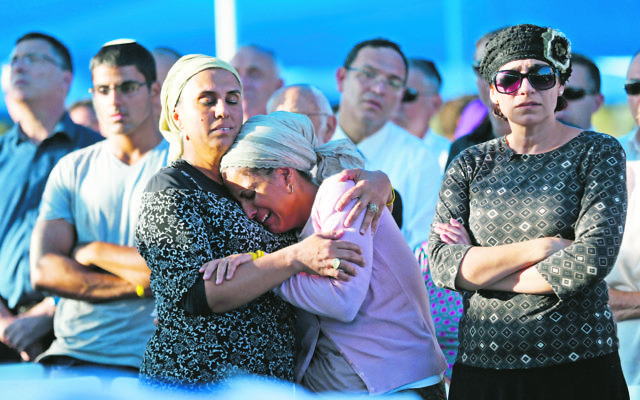Jewish world ‘enveloped in grief’
The throngs just kept coming, as far as the eye could see – a long human train, with a freight of grief.
Everybody headed towards the area where eventually, three bodies on stretchers, draped with Israeli flags, were assembled. In Israel, coffins aren’t used, and the flags hid the marks of the terrorist’s brutality that are believed to have been evident on each of the boy’s young bodies. But the flags couldn’t hide the fact that they had the shape of boys not men, reminding everyone that they were far too young to die.
Of the tens of thousands of Israelis who endured the sweltering heat for Tuesday’s tragic triple funeral in an open area of Modi’in, most had never met even one of the three murdered teens – but the boys had become familiar to everyone. “I feel that someone I know has died,” said Kinneret Alkabi, 16, who lives in the settlement of Tel Menashe.
Many people said that they didn’t even have to think about whether or not to attend – it was their automatic response, as the right thing to do. “This is as close as one can get to what happened,” commented David Dreshauss, a 73-year-old from the northern Israeli city of Karmiel. “What can you do in a situation like this? So you express yourself in the best way that you are able.”
Like lots of others, Dreshauss couldn’t express himself. “There are no words to describe this,” he said. “It’s an empty feeling.”
At some points during the long wait for proceedings to start, the crowd broke out into spontaneous song. “May this be a time of mercy,” went one of the songs, borrowing from the High Holy Days liturgy. Another song was based on the traditional prayer for Jews in distress. Rarely do so many Jewish men and women sing together.
“We’re all torn apart inside,” said Varda Frank, a Jerusalem housewife in her 50s. Though the vast majority of the mourners at the funeral were Orthodox, she said that the cause of the boys has dramatically brought together Israelis of different backgrounds. “It doesn’t matter if you’re religious or not – this kind of tragedy could happen to anyone,” Frank commented.
The theme of unity was recurrent in eulogies. Dov Zinger, head of the Mekor Haim yeshivah in the West Bank, where two of the victims studied, declared: “Two Jews, three opinions, but one heart.” David Lau, one of Israel’s two chief rabbis, echoed this, saying that the boys have brought people “closer to the heart, closer to the people, closer to unity among the people of Israel”.
President Shimon Peres discussed the sense of loss that the nation feels. “We prayed, each of us alone and all of us together, for a miracle,” he said. “We prayed that we will seem them return in peace to the families, to their homes and to us all. Sadly we were hit by the tragedy of their murder and a deep grief enveloped our people.”
For the families, the pain was unbearable. “We are living as if we are in a movie, whose ending is as bad as can be,” said Shirel Shaar, sister of the late Gilad Shaar, shortly before the triple burial.
NATHAN JEFFAY


comments